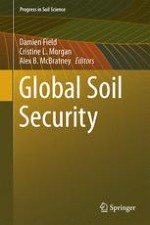2017 | OriginalPaper | Buchkapitel
35. Save our Soil to Save the Planet
verfasst von : Michael Jeffrey, Hayley Achurch
Erschienen in: Global Soil Security
Verlag: Springer International Publishing
Aktivieren Sie unsere intelligente Suche, um passende Fachinhalte oder Patente zu finden.
Wählen Sie Textabschnitte aus um mit Künstlicher Intelligenz passenden Patente zu finden. powered by
Markieren Sie Textabschnitte, um KI-gestützt weitere passende Inhalte zu finden. powered by
